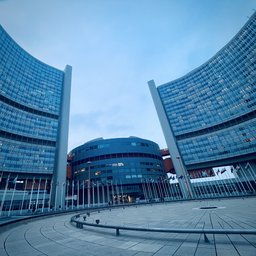While not a major calendar event for many in the Internet technical community, the OECD’s 2022 Digital Economy Ministerial Meeting nonetheless provided a timely and compelling platform for dissecting the challenges, concerns and opportunities of our information society.
The Organisation for Economic Co-operation and Development, or OECD (...or OCDE if you’re in France) is an odd duck… or at least a unique bird in the aviary of global governance. Formed shortly after the Second World War (to help administer the Marshall Plan), it has been an influential forum on economic issues, and more recently it has turned its attention to the “digital economy”. While its membership consists of 38 member states, the frameworks and approaches developed and agreed in OECD discussions are often influential far beyond those states. And since 2008 - at the first OECD Ministerial meeting on the “Internet economy” - the RIPE NCC has participated in these discussions as part of the Internet Technical Advisory Committee (ITAC) - along with advisory committees representing business, trade unions and civil society, ITAC has a seat at the table (if not an equal voice to the member governments).
The OECD recently wrapped up its Digital Economy Ministerial Meeting. This first Ministerial since 2016, the meeting was built around the heading of "Driving long-term recovery and economic growth by building a trusted, sustainable, and inclusive digital future” and specific themes of “Digital enablers of the global economy”, “Building better societies”, “Putting people first in digital transformation”, and “Harnessing the power of AI and emerging technologies”.
Like so many Internet (or digital) governance discussions of late, geopolitical and technical events were ever-present, both explicitly and in more subtle ways. The Russian invasion of Ukraine quietly dominated many sessions, from the remote intervention by Ukrainian Vice Prime Minister and Minister for Digital Transformation, Mykhailo Fedorov, in the opening segment, to the ongoing discussions of mis/disinformation on social media, and the pervasive impact of the conflict on international trade and supply lines. US Ambassador at Large Nathaniel Fick was blunt in assessing that Russian President Vladimir Putin had given the OECD and its 38 member states an “opportunity” to lay out a cohesive commitment to a global, “human-centric” (buzzword of the week!) Internet.
At the same time, as our social media feeds fill up with Lensa AI portraits (clothed and otherwise!) and breathless tales of ChatGPT’s latest and greatest achievements -- how much of this piece was written by ChatGPT, I’ll never tell… [edit by ChatGPT: 84.3%] -- the agenda’s significant focus on regulation of artificial intelligence (AI) seemed remarkably timely. But it’s where some of these issues intersect (for instance, the impact of AI on disinformation capabilities) that you begin to appreciate both the urgency and complexity of the challenges currently facing us.
The primary outcome of the Ministerial is a 'Declaration on a Trusted, Sustainable and Inclusive Digital Future’, signed by all the OECD Members States as well as four non-members states: Bulgaria, Croatia, Romania, and Peru. This is a wide-ranging document that includes a commitment to “advancing the multi-stakeholder system of Internet governance globally”.
In addition, the OECD members used the event to finalise a ‘Declaration on Government Access to Personal Data held by Private Sector Entities’, and a number of other documents or translations.
For the RIPE NCC, participation in the event was an opportunity to draw some focus to the risk and threats to a global Internet, including specific examples such as the impact of economic sanctions on multistakeholder governance approaches. A Day 0 “Stakeholder Day” panel provided a chance for representatives of governments, civil society and OECD researchers to hear from (and interrogate) speakers from the RIPE NCC, ICANN and the Internet Society on Internet fragmentation. Looking ahead, the OECD, with its focus on ensuring the fundamentals of open global trade, may be an important voice in addressing these risks.
Helping to shape and amplify this voice may be a new OECD Global Forum on Technology, which is currently being considered by the OECD’s Committee on Digital Economy Policy. With plans to involve more than just the OECD’s member states, the Forum may provide a useful new element in the the global efforts to understand emerging risks and devise appropriate solutions. The RIPE NCC (along with our fellow ITAC members, including the other Regional Internet Registries) will be following developments, and looking for opportunities for the Internet technical community to contribute.





Comments 0
The comments section is closed for articles published more than a year ago. If you'd like to inform us of any issues, please contact us.